Stomatitis in Cats Natural Treatment
Since 2005, our GMP-certified natural remedies for stomatitis have been helping cats with this painful condition. Each product is meticulously tested for purity and potency, and our transparent labeling ensures you know exactly what you're giving your cat. Many happy cat parents have shared their success stories, and we hope you can read these testimonials to see how our home remedies might work for your cat. By learning from others' experiences, you can feel confident in the positive impact our feline stomatitis treatment can have on managing your cat’s symptoms. While there isn't a cure for stomatitis in cats, we are dedicated to helping you find relief for your pet.
How To Treat Stomatitis Naturally
Ask Ariel’s home remedies are easy to use and can help reduce symptoms such as painful mouth sores and red, inflamed gums. Our homeopathic remedies help control gum infections, probiotics support a healthy gut, quercetin alleviates allergic responses, and hemp extract provides relief from pain.
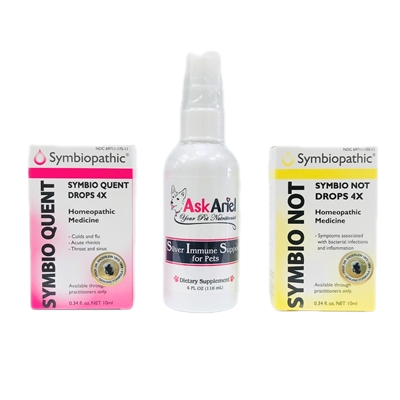
Immune Support Kit - An effective, easy to use cat mouth infection home treatment. Contains three tasteless, natural remedies to deliver fast relief for your cat's stomatitis symptoms. They provide relief by calming infection and inflammation. The Immune Support Kit supplements can be mixed in a small amount of soupy canned food making them easy to administer. The items in the Immune Support Kit can also be purchased individually.
Learn more about the Immune Support Kit.
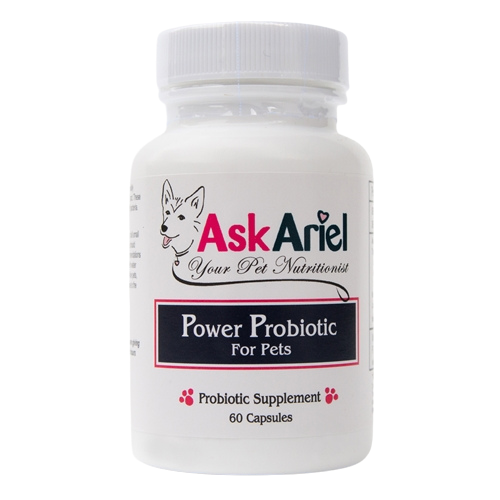
Power Probiotic - Our Power Probiotic is an essential cat mouth sores home remedy, promoting healthy bacteria to boost your cat's immune system. Ensuring the mouth and digestive tract are healthy is vital as the mouth acts as the starting point for the entire digestive system. By supporting beneficial bacteria, Power Probiotic addresses the root causes of inflammation and infection associated with stomatitis, helping manage and prevent mouth sores in cats.
Learn more about Power Probiotic.
.png)
Happy Paws Hemp Extract - Happy Paws is a feline stomatitis coconut oil and hemp blend. CBD and coconut oil contain natural anti-inflammatory properties to provide pain relief for cats with stomatitis. Relieves discomfort, making eating less painful.
Learn more about Happy Paws.
.png)
Immune Harmony - The plant sterols and the potent antioxidants found in Immune Harmony can help keep your cat's immune system in balance and improve the inflammatory response associated with stomatitis. Supports the long-term health of your cat's immune system.
Learn more about Immune Harmony.
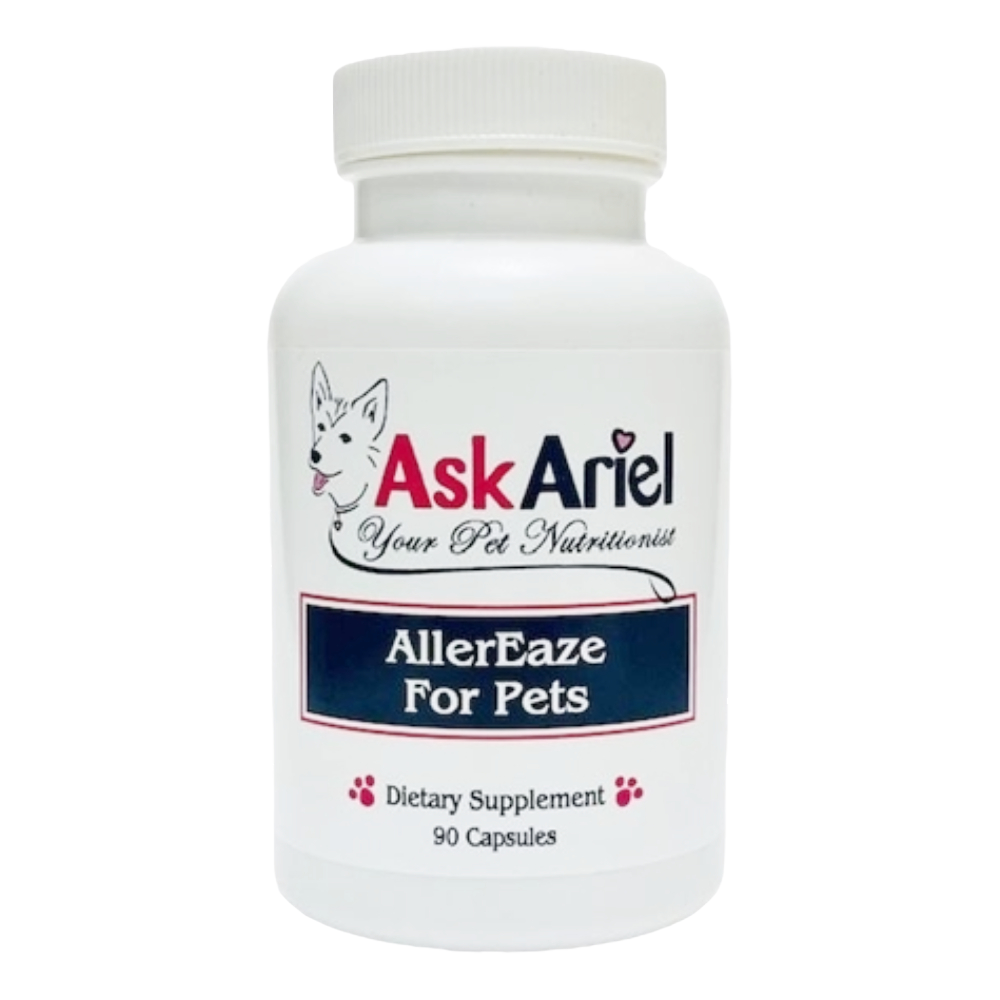
AllerEaze - AllerEaze is a natural antihistamine supplement for cats with stomatitis (aka "teeth plaque allergy"). AllerEaze helps to calm the inflammatory response and reduce the swelling in the gums and throughout the oral cavity. This effective cat gum disease treatment contains quercetin, which may help alleviate discomfort and swelling.
Learn more about AllerEaze.
Daisy
"This is our sweet Daisy girl! Daisy had a severe case of stomatitis that would not clear up. I found and reached out to Ask Ariel on their recommendations. Daisy took the QUENT Drops, NOT Drops and Immune Harmony. I also changed Daisy’s diet using Ask Ariel’s diet tips and info. Daisy is now like a new cat, she is not drooling, not in pain, and is able to eat her food with ease! Thank you, for helping our sweet girl live a normal, happy and healthy life!" - Brittany, Pennsylvania
What Is Stomatitis?
Feline Stomatitis is an inflammatory condition that causes painful sores to form on the lips, gums and inside of the cat's mouth. It is a progressive autoimmune disease where the cat forms antibodies to its own tissues and attacks itself. In the early stages, stomatitis may appear to be dental disease or gingivitis.
Symptoms of Stomatitis
The most common symptoms of stomatitis may include:
- Bad breath (halitosis)
- Red, inflamed gums
- Mouth sores or ulcers
- Cat not wanting to eat (anorexia)
- Bleeding from gums or mouth
- Plaque and tartar accumulation
Pumpkin's Stomatitis Got Better
"This is Pumpkin who has been using your supplements (Immune Harmony, Power Probiotic, QUENT/NOT and Silver Support Spray), for about 8 months or more. He has Stomatitis, rodent ulcers, and many autoimmune issues. He has not had ANY flare ups since using the products, switching his food, and taking him off steroids which the Vet kept him on. Again, I think you more than anything...He is my angel, and you have given me the chance at giving him the healthy life he deserves. Thank you." - Cassandra, Georgia
Stomatitis Vs. Gingivitis In Cats
Feline Stomatitis is an autoimmune condition where a cat's mouth develops a hypersensitivity to bacterial plaque. Studies report that as many as 85% of cats over three years of age suffer from some form of dental or gum disease. Most dental diseases are caused by plaque and tartar, but others are linked to viral or autoimmune diseases. Chronic viruses weaken a cat's immune system and may predispose them to gingivitis and stomatitis. Cats with
feline immunodeficiency virus (FIV), feline leukemia virus (FeLV), or feline calicivirus (FCV) should be closely monitored for tooth and gum problems.
Both stomatitis and gingivitis in cats may present with very similar symptoms, but they are two conditions with different causes. Left untreated, stomatitis can lead to gingivitis and feline periodontal disease.
So, what is the difference between gingivitis and stomatitis?
- Gingivitis is the inflammation of the gums. It is the beginning of dental disease in a cat's mouth. Bacteria on the teeth form a biofilm coating that can harden into plaque and migrate under the gumline. This can lead to bacterial infection and inflammation. Bad breath will coincide with swelling and redness at the gumline. The gums may bleed, causing discomfort and loss of appetite.
- Stomatitis, also known as Lymphocytic Plasmacytic Gingivostomatitis Complex (LPGC), is inflammation of the mucous lining in the mouth. The inflammation spreads from the gums to other areas of the mouth including the tongue, lips, the roof of the mouth and commonly extends to the back of the mouth and into deeper tissues. Stomatitis is a "tooth-plaque allergy" and the cat’s immune system may be responding too aggressively to the bacteria and plaque in the mouth. Mouth ulcers and lesions can form throughout the mouth. It can be extremely painful and cats will often have difficulty eating, drool excessively and paw at the mouth. The pain may lead to anorexia and other health conditions.
Topaz
"My name is Topaz. At the end of last year I got feeling so bad I couldn't eat - my mouth felt like it was on fire! My family was so worried about me and they took me to the vet. I was diagnosed with stomatitis. It was recommended I had all my teeth removed!!! That would have been devastating! The quote was over $2500. My "mom" is an Integrative Health Therapist - she knew nature had a much better way and searched all over the Internet. Wow, I'm so glad she found AskAriel.com!!! They helped save my gums - just by putting a few Silver sprays, Quent & NOT drops on my grain-free food that I relish. My food still tastes good, and my appetite is super :) My last Vet check went great - no more stomatitis, though they still need to treat my gums. And I need to be more active in my senior years. The Vet was shown a picture of what saved my gums. We totally want to keep this working, so we're sticking with the kind, encouraging experts at askariel.com." - Linda, California
What Is FME In Cats?
Full Mouth Extraction (FME) is a surgical procedure in which all of a cat’s teeth are removed for the treatment of stomatitis. Stomatitis is caused by the immune system overreacting to and attacking plaque on the surface of the teeth. It seems as simple as cause and effect: if you remove the cause (which are the teeth with plaque) you will no longer have the effect (inflammation of the mouth and gums). Right? Stomatitis in cats is not that simple. It is a complex autoimmune disease set off by triggers such as food allergies, stress, viruses and poor digestion, so many cats who have FME will still have symptoms (red, inflamed gums) even after the procedure is performed.
Many veterinarians consider FME as a last resort in terms of treatment options for stomatitis. Dental cleanings and extractions of infected teeth are usually performed first. FME is proposed in cases where a cat has had courses of steroids and antibiotics, along with dental maintenance, but seen no long-term improvement in their condition. As with any surgery, there are risks, such as infection or sensitivity to anesthesia, that are associated with FME. Unfortunately, full mouth extraction does not cure stomatitis. Even after all of a cat's teeth are removed, the painful symptoms may often recur because the underlying autoimmune condition and digestive issues have not been addressed.
Trixie
"We adopted Trixie from the Animal Rescue League and loved her from first sight! She was so tiny! Fit in the palm of my hand & was a little stinker as a kitten. Always in things she shouldn’t be, but always so cute, it was hard to be mad. At her first annual appointment, I had told our vet that I was noticing she had bad breath and was a bit lethargic. After checking her mouth, I was told she had Stomatitis. I have had cats all my life and had never heard of this. After discussing treatment options which included steroid shots to extracting all her teeth, I was overwhelmed. How could this be happening? How did this cutie pie develop an autoimmune disease that could be that life altering? I remember discussing the vet recommendations with my husband with tears running down my face. I told him that I felt helpless & needed to figure out an option.
I spent 4 hours Saturday morning scouring the internet to educate myself and look for options. I found AskAriel. I had to read the website information twice (omg – did I really find something?!?) and decided to give it a try as I wasn’t finding anything else. I felt hope! Trixie takes Power Probiotic, Soothing Digestive Relief (she developed runny stools), Immune Harmony, NOT Drops and QUENT Drops. As she started feeling better, I finally looked at her gums. The AskAriel treatment was working! Subsequent vet visits confirm her Stomatitis is under control and recommend teeth cleaning as needed. Unbelievable – we went from one extreme to an average cat check up! AskAriel has been so helpful during our journey, I am thankful we found them! I don’t think this is a business for them, I believe they truly care and want to help with information & alternative options. I hope Trixie’s story will help others in a similar situation. There is hope and a solution for a better life for your fur baby! - Jill, Iowa
What Is Feline Tooth Resorption?
Feline tooth resorption is when a cat’s body begins to break down a tooth, usually starting in the enamel along the gum line. The process will continue to the center of the tooth. Eventually, the entire tooth will be destroyed and there will only be a raised bump on the gum. There isn't a definitive answer as to what causes this condition. Some researchers believe that an excess of vitamin D in commercial cat food might be to blame for the breakdown of the dental structure.* Research shows that purebreds (especially Abyssinian, Siamese, Russian Blue, Scottish Fold, and Persian) have a higher incidence of the disease than mixed breeds.
There are two types of tooth resorption. Type 1 involves the destruction of the crown and Type 2 is the disintegration of the root. The resorption is graded on a scale of 1-5, depending on the extent of tooth loss. How far the tooth has progressed will help your veterinarian determine the treatment plan. Unfortunately, if your cat has one tooth with resorption, there is a possibility that other teeth will also be affected. It is important to have regular dental check-ups and monitor closely.
*Reference: Article: Tooth Resorption. Cornell University College of Veterinary Medicine.. May 22, 2018.
Max & Sasha's Stomatitis Got Better
"I adopted my 2 kitties, Max and Sasha, who had been neglected in their previous home. I took them to the vet and found out that Max was suffering from a severe case of stomatitis and Sasha also had a mild case of stomatitis. For almost a year, Max suffered through rounds of antibiotics and steroid shots, trying to calm his symptoms just so he'd be able to eat. Then I found AskAriel. I received a food recommendation from Ask Ariel that I was able to find in my local pet store. I also started giving the kitties Power Probiotic for Pets, Immune Harmony, and QUENT. A year later, the kitties visited the vet and she was thoroughly impressed with Max and Sasha. She said she didn't see anything unusual...no redness, no sores, no buildup on the teeth or anything! I now have two of the happiest kitties on the planet! Thanks for such amazing products!" - Angie, Louisiana
Stomatitis In Cats Treatment At Home
Cats with stomatitis can be especially sensitive and usually don't like their mouth to be touched. This can make the administration of supplements challenging.
- Easy To Administer: The Immune Support Kit and Power Probiotic are the easiest to administer. They provide short-term immune support in the mouth and clients generally start to see some improvement in symptoms soon after using. The Immune Support Kit contains three tasteless liquid remedies. Most cats love the taste of Power Probiotic.
- Moderately Easy: Happy Paws Drops are organic hemp extract drops to relieve pain and inflammation. The coconut oil base is feline-friendly. Hemp extract does have a distinctive odor, so if your kitty is especially finicky and doesn't like anything they can smell or taste, you may need to give with a syringe.
- Oral Supplement Syringe Required: Immune Harmony and AllerEaze are herbal remedies and most cat owners need to administer them with an oral supplement syringe. They both come in capsule form and need to be opened and divided. Immune Harmony has a mild flavor and odor. Some cats will eat it when mixed in a small amount of canned food. AllerEaze is an important supplement for stomatitis in cats due to its antihistamine properties. Cats do not like the taste and it needs to be administered with a syringe. If your kitty is very sensitive to herbal remedies, AllerEaze could become overly stressful and burdensome to administer.
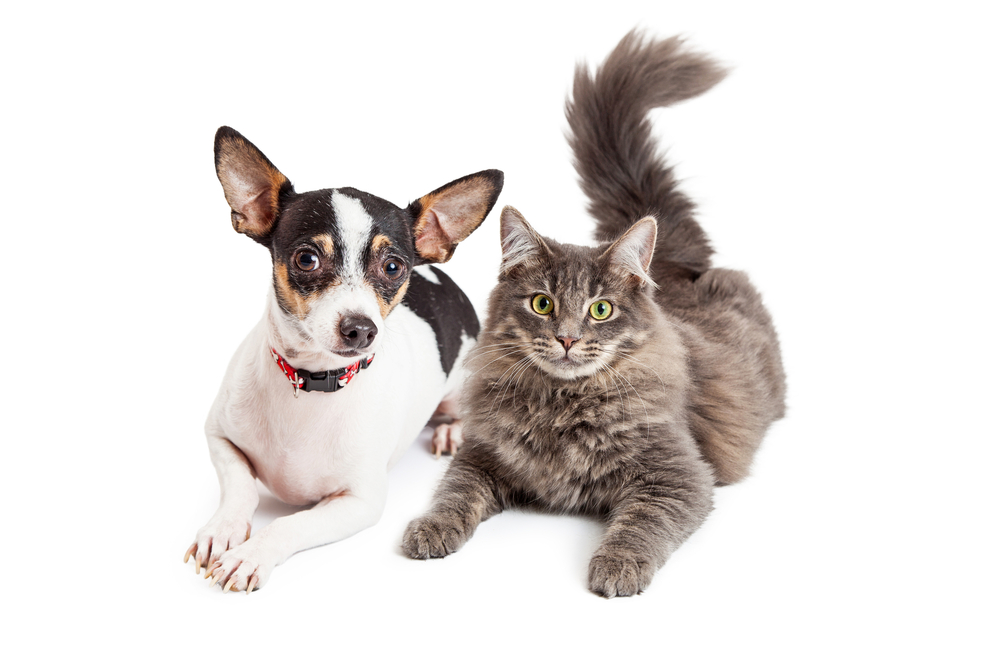
Can Dogs Get Stomatitis?
Although much less common than in cats, dogs can also suffer from stomatitis. The symptoms will present similarly to cats with the soft tissue inside the mouth becoming irritated and inflamed. Ulcers may form on the lips, tongue, gums, soft palate and also on the back of the throat. Your dog may be in extreme pain which will make it hard for them to eat, drink and groom themselves affecting their overall wellbeing. If left untreated, the infection can spread through your pet’s bloodstream and infect other organs.
There are two types of stomatitis, acute and chronic. Dogs are more commonly diagnosed with acute stomatitis and usually respond well to treatment to clear the infection. Once the infection subsides, maintaining a good oral hygiene routine, including at-home brushing and professional dental cleanings, can help avoid repeat flare-ups.
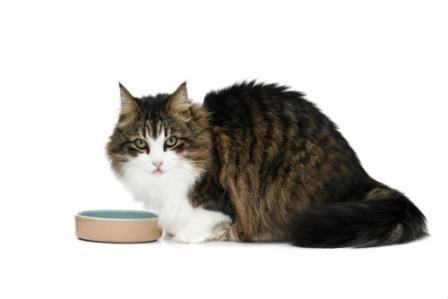
Diet For Cats With Stomatitis
Stomatitis is also referred to as "tooth plaque allergy". Why is the source of the allergy attack in the mouth? Cats with stomatitis develop an allergy to the plaque on their teeth. The mouth represents the beginning of the digestive tract so these allergies can trigger a flare-up in the mouth. When treating stomatitis in cats naturally, it is essential to reduce the cat's allergic reaction by changing the cat's diet to eliminate food allergens.
Certain food allergens can worsen inflammation. Many cat owners might not realize that many foods, even the highest quality, grain-free diets are contributing to the stomatitis condition. Dry food, for example, is made with starchy carbohydrates which convert to sugar. Cats are carnivores and the carbohydrates can weaken their immune system, triggering an auto-immune reaction.
Cats with stomatitis need a low carbohydrate, hypoallergenic, carnivorous diet. A soft food diet is helpful for kitties with mouth pain and inflammation. Cats can be allergic to common protein sources, so feeding a novel protein diet can help. There isn't a "one diet is best" because each kitty has its own history of health issues. Diet changes are critical for treating stomatitis, periodontal health and bad breath, so please be sure to include your cat’s diet on the order form at checkout. We'll include a diet suggestion for your cat on the packing slip that comes with your product directions.
Need Help?
If you have questions about which products to use, please feel free to email us at [email protected].
|
|
|
How can I treat my cat’s stomatitis at home?
Natural holistic treatments including diet changes and supplements can help you treat your cat’s stomatitis at home. Stomatitis is a progressive autoimmune condition, where a cat’s mouth develops a hypersensitivity to bacterial plaque. Food allergies and a weakened immune system are thought to be contributing factors and can trigger flareups. Stomatitis, also referred to as tooth plaque allergy – can be helped by reducing the triggers - feeding a hypoallergenic, novel protein diet and using natural supplements to help modulate the cat’s immune system.
Can stomatitis in cats be cured?
Stomatitis is an inflammatory autoimmune condition in a cat’s mouth. It is a progressive condition that can worsen over time. There is not a cure for stomatitis, but holistic treatment can help to manage flare-ups and reduce the severity of symptoms, such as mouth pain, sores, bleeding gums, bad breath, infection and inflammation.
How long can a cat live with stomatitis?
While stomatitis is a painful, chronic condition, holistic treatments can help to manage the symptoms, enabling your cat to live a normal life. Natural supplements combined with a hypoallergenic diet can help your cat avoid stomatitis flare ups, which can trigger bleeding gums, ulcers, inflammation and anorexia. Poor digestion, food allergies and low-quality food all impair a cat’s digestion. Since the mouth is the beginning of the digestive tract, improving a cat’s stomatitis symptoms involves improving the cat’s digestive process overall. Many pet owners have used holistic treatments along with conventional veterinary care from their veterinarian to help their cats with stomatitis live to their full life expectancy.
What should I feed my cat with stomatitis?
Cats are carnivores and need a high moisture diet. The best diets for cats are low in carbohydrates, feeding a novel protein. A natural, hypoallergenic diet can help your cat with the symptoms of stomatitis. Cats with stomatitis may have several health issues occurring simultaneously with the stomatitis so there isn’t one diet for stomatitis that works well for all cats. Based on the information you provide on your order form, we include free diet tips for cats with stomatitis on the packing slip that comes in your package.
What does stomatitis look like?
Feline stomatitis inflames and thickens the mucosal tissue in the mouth and gums, resulting in redness, ulcerations, and bleeding in the mouth cavity. It can look like ulcers or blisters. Many cats with stomatitis will paw at their mouths and not want to eat because of the pain. Stomatitis also causes drooling, bad breath and weight loss. Some cats with stomatitis also experience tooth resorption.
|
|
|